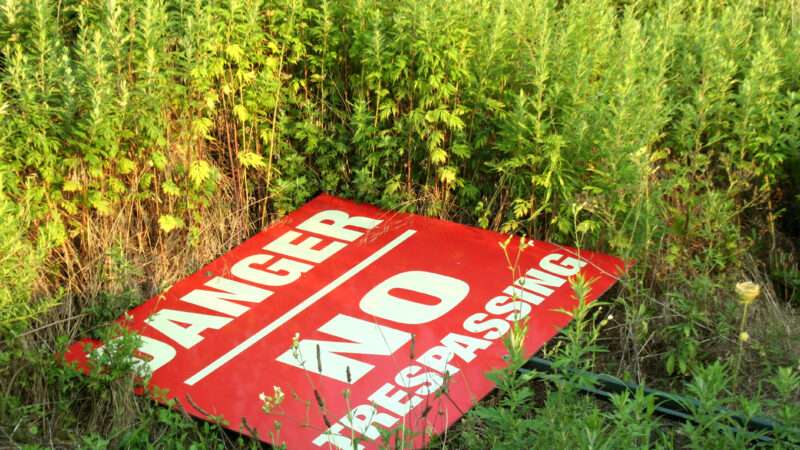
A Louisiana law allows state wildlife agents to come onto private property without a warrant or the owner's permission. One property owner is suing, seeking to get the practice declared unconstitutional.
Tom Manuel is a self-described "lifelong outdoorsman," professional forester, and wildlife biologist who manages forestland for clients in east Louisiana. He also owns a 240-acre parcel of undeveloped land that he uses primarily for harvesting timber, but where he also hunts. The property is only accessible via a locked gate, and the property line is ringed in blue paint, fencing, and "No Trespassing" signs.
On two different occasions in December 2023, agents with the Louisiana Department of Wildlife and Fisheries (LDWF) came onto Manuel's property without permission or a warrant. Each time, agents drove to the end of a public road and past the gate, which had been left unlocked because Manuel or a family member was hunting on the property.
The first time, an agent was waiting by Manuel's car when he got back to it after hunting; the agent checked that Manuel had his hunting license, which he did. The second time, two agents showed up while Manuel's brother hunted on the land, and Manuel arrived as they were leaving.
Manuel says he has only ever received one hunting citation, in 2019, when he hunted on a friend's land that he didn't realize had allegedly been illegally baited; "everybody who went [there] to hunt that morning got a ticket," Manuel tells Reason.
But in December 2023, when Manuel asked agents why they had come onto his land twice in the same month, one agent noted that it was "just like dove season 2019," which Manuel says he took as a "veiled threat."
LDWF agents operate under a state law that allows them to "see that every person" hunting or fishing "in the territory assigned to him…has in his possession, and is the owner of, an official license, and is in compliance with the laws, rules, and regulations under the jurisdiction of the department." With no further stipulations regarding the need for a warrant to enter private property, the statute effectively gives agents carte blanche to trespass.
Last week, Manuel filed a lawsuit against the LDWF and three department officials, seeking to have the practice overturned as an unconstitutional search and seizure. He is represented by the Institute for Justice (I.J.), a public interest law firm.
The Louisiana Constitution "could not be clearer," says Josh Windham, an I.J. attorney involved with Manuel's lawsuit. "It doesn't just protect what the Fourth Amendment says—persons, houses, papers—it lists property in the text as what it protects from unreasonable searches. And if land is anything, it is property, right?"
As Reason has reported, many state wildlife agencies—as well as the federal U.S. Fish and Wildlife Service—routinely trespass on private land without a warrant or the property owner's permission. The Fourth Amendment to the U.S. Constitution protects against unwarranted searches in one's "persons, houses, papers, and effects." But the U.S. Supreme Court ruled in a now-century-old case from the Prohibition era that "open fields" do not enjoy the same Fourth Amendment protections as a person's home and the area immediately surrounding it; the court later affirmed the finding in 1984.
Some states have greater protections against search and seizure than the Fourth Amendment. Manuel also operates in nearby Mississippi, where he notes that this does not seem to happen: "I've got a list that fills up a couple of legal pages of [wildlife agent trespass] events in Louisiana, and I know of zero in Mississippi, over the same span of time." Indeed, in 1970's Davidson v. State, the Mississippi Supreme Court found a game warden's search of a suspect's land to be unconstitutional, noting that the "right to be secure from invasions of privacy by government officials is a basic freedom in our Federal and State constitutional systems."
But with the open fields doctrine still active Supreme Court precedent, nearly the entire country—everything except a person's house and the area immediately around it—is theoretically fair game for state incursion, as far as the federal government is concerned. In a study published in the spring 2024 issue of Regulation, a publication of the Cato Institute, Windham and I.J. research analyst David Warren found that "in practice, the doctrine excludes at least 96 percent of all private land in the country—nearly 1.2 billion acres—from Fourth Amendment protection."
Open fields litigation is ongoing in several other parts of the country: In Pennsylvania, game wardens routinely trespassed onto the property of hunting clubs before finally just setting up their own trail camera to surveil hunters. In Tennessee, wildlife agents installed trail cameras on private property without a warrant. In an I.J. lawsuit by two affected property owners, a three-judge panel from the Benton County Circuit Court deemed the practice unconstitutional under state law, affirming that the Tennessee constitution is more protective of private property rights than the Fourth Amendment. The state has appealed the decision.
The post Louisiana Law Lets Wildlife Agents Trespass on Private Property appeared first on Reason.com.







